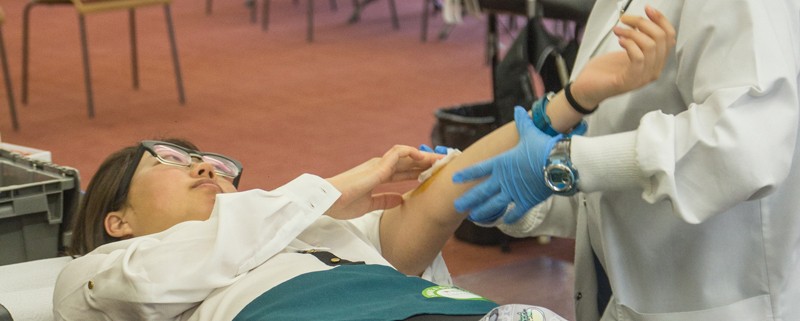Red Cross Club holds blood drive in Campus Center
USC’s American Red Cross Club is holding a blood drive from Tuesday until Thursday in partnership with the Trojan Scholars Society and the Inter-Health Council. The drive will be held from 8 a.m. until 2 p.m. in the Franklin Suite of the Tutor Campus Center.
It’s the first time that the three clubs have worked together on a blood drive.
“We believe it is important to work together as a student community of pre-health scholars to help out the public and our community,” said Sathvik Shastry, the Inter-Health Council president. “We encourage passionate students to help out and support their community.”
The United States is facing a major blood shortage and the USC Red Cross Club hopes that USC students will do their part to help out.
“A lot of people don’t realize that students make up a huge percentage of donated blood, and it may always seem like there is always a need for it, but that’s precisely because it’s true,” said Kevin Kong, the club’s biomedical chair. “Even fewer people don’t know that every two seconds another person needs a blood transfusion.”
Kong further highlighted just how consequential donating blood can be to potential patients.
“Each pint donated can save three patients’ lives, so there is no questioning our mission’s importance,” Kong said.
While there, students can also get their cheek swabbed and register for bone marrow donations. Rebecca Sauer, president of the Red Cross Club, explained that these donations can be used in treatment of a variety of different maladies.
“It’s cancer patients, it’s automobile accident survivors, it’s your little sister, your mom, your best friend,” Sauer said. “Blood donations are constantly required, and by bringing a blood drive to campus, we’re helping to ensure that patients can receive the blood they need, while making the entire process as easy for students as possible.”
According to the Miller-Keystone Blood Center, donations are in constant need because of the short shelf-life of blood. Donated blood lasts only 42 days, while platelets, which are in blood cells and are used to treat burns victims and cancer patients, last only five days.
The event is sponsored by Sprinkles Cupcakes and Yogurtland, and both companies have donated products for the donors.
The organizers are hoping to match — if not beat — their record of 143 donations over the three days, Kong said.
Though many book their appointments in advance, Kong is hoping for at least 20 walk-in donations a day.
The donation process takes roughly an hour, including the 15 minutes of observation after the blood is drawn.
Red Cross recommends drinking extra liquids following the donation, as well as avoiding strenuous exercise.
It takes only 24 hours for plasma to replenish itself after a donation, but it takes around six weeks for red blood cells to be replenished completely, which is why eight weeks are required in between donations.
“We are grateful for such willing volunteers that strive to help others,” Kong said. “The blood drives really encompass what it means to give back to the community as a Trojan.”

